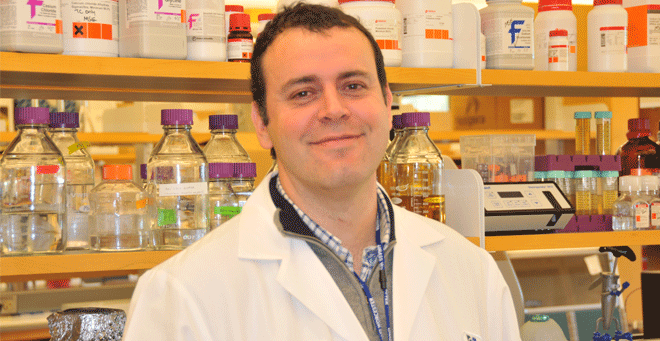 |
|
|
Miguel Sena-Esteves, PhD |
A rare breed of ancient sheep called Jacob has played a key role in scientists working to find a treatment for Tay-Sachs disease, a neurodegenerative disorder that attacks newborns. Miguel Sena-Esteves, PhD, associate professor of neurology and a member of the Horae Gene Therapy Center, talked to the Washington Post about the progress he and others have made in developing a gene therapy treatment for the disease.
Tay-Sachs disease, a devastating neurological disorder, causes deterioration of mental and physical abilities starting at 6 months of age and usually results in death by the age of 5. It is one of 40 rare, inherited metabolic disorders called lysosomal storage diseases that result from a breakdown in a cell’s ability to remove or recycle waste products due to a missing enzyme. The gradual build-up of waste inside the cell eventually results in cell death and causes the slow breakdown of motor and neurological function in patients.
In 1999, it was discovered that a small number of a rare breed of sheep being raised on a ranch in Texas by Fred and Joan Horak were dying shortly after birth. The genetic mutations responsible for the sheep’s illness was an 86 percent DNA match with the human HexA gene that causes Tay-Sachs in humans.
The Jacob sheep have helped inform the work of Dr. Sena-Esteves and his colleagues at the Tay-Sachs Gene Therapy Consortium who are using a recombinant adeno-associated virus (rAAV) vector to replace the faulty HexA gene in humans. Once introduced into the brain, the functioning gene begins making the missing HexA enzyme, turning parts of the brain into mini-factories. Capitalizing on the natural pathways of the brain, those enzymes are then distributed throughout the brain, allowing cells to resume their natural metabolic functions and remove waste products.
Their work has extended the life of the sheep by 50 percent, from an average of nine months to 14.3 months. They now hope to be able to find funding to take these advances to clinical trials in humans someday.